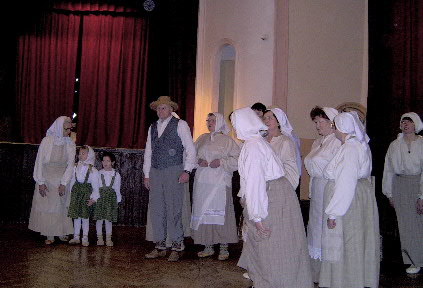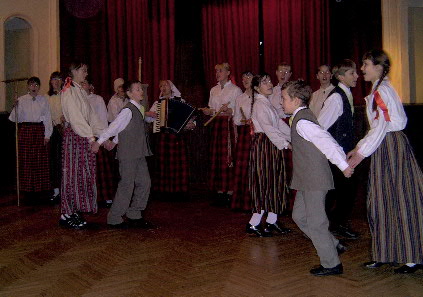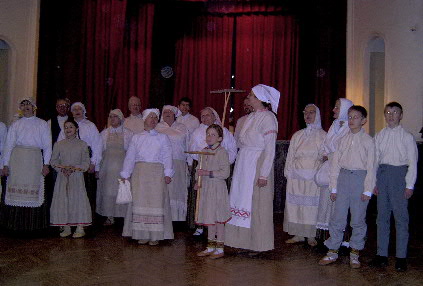|
|
|
|
|
Folklore groups
Instruments Activities About us |
|
|
|
Calendar
Regular Reportings Education |
|
|
|
Support
Fonts Mpeg3 Links Addresses Statistics Guestbook |
|
|
|
You are visitor of folklora.lt and visitor of this page. |
|
Review for the festival Baltica'03, Viluoni,
A white cold of the Latvian winter, the broken by it boiler of Vilani system
of heating and hospitality of Vilanians were a context of this activity.
However, the concert induced on an idea of spring, summer and festival
Baltica 2003. Certainly, it is uneasy to show summer programs and to
sing songs about hay in winter-time, but nothing to do - the festival will
take place in the summer, and its subject this year is hay, milk and related
things.
Children and youth folklore group Biteites from Vilani have shown
shepherd's roundels and songs. Children acted unchained, in ensemble there are
a lot of participants capable to sing good.
Rezekne folklore ensemble
Rūta
have prepared a program of a hay joint-work with songs, riddles and jokes.
Some songs were accompanied by harmonica and washing board, maybe because the
leader wants to give to the performance more interesting sounding, though it
does not correspond to local traditions.
Feimani folklore group
Olūteņš
acquainted the spectators with various joint-works in a Latgalian court yard -
hay, potato, trip behind fire wood and "porks funeral". The interest of
the ensemble in the folklore heritage of the area is evident, however in the
performance sometimes is felt an uncertainty.
Rogovka ethnographical
ensemble has pleased the spectators with an authentic manner of singing.
Performance was devoted to a shepherd's life.
In the folklore ensemble Atauga sing retaired teachers of the district.
Sounding is close to traditions of vocal ensembles, instead of folk singing.
Though the listeners was not too interested in the performance, the main thing is
that the particpinats itselfs like what they are doing.
Rikova ethnographical
ensemble already for many years performs in the form of a dramatized
play. This time ensemble showed performance about a break on haymaking. The
performance has a good rate, brisk dialogues. Singing is regular, however
showings of the contents of songs makes them artificials.
Folklore group
Viļuonīši
have prepared a program of haymaking with characteristic conversations, songs
and dances. In the performance some ethnographical things - wooden rakers and
pitchforks - was showed, that acquaints spectators with their use. The ensemble
dances well, it is felt, that the participants like to deepen their skills of
the folk singing.
Sakstagols folklore ensemble Kolnasāta
has pleased all listeners with three perfect songs about haymaking,
natural manner of performing, good sensation of the hall. They
has created impression, that all of us are on a meadow.
Bierzhgols ethnographical ensemble sang about joint-works, using both old
joint-working songs and absolutely new shlagers. The manner of singing
reminded a vocal ensemble, and the performance was illustrative and unnatural.
Muokunkolns folklore ensemble sang about human life - from a cradle up to
a tomb. The ensemble has a small experience of a dialogue with spectators,
therefore at times they concentrated on themselves, instead of on a bringing
songs home to listeners.
Dancing collective of Makashani handicraft school
Kūkleite
has shown treatments of local dances. It is that case, when people
underestimate their wealth - they have well preserved traditions -
and are afraid to take it out on a stage in pure, not spoiled kind.
Uzulmuizha folklore ensemble is only some months old, therefore it is
possible just to wish them to not lose desire to master traditions
of area.
Article: Māra Mellēna, 11 February 2003 |
|
Questions, comments and suggestions are welcome to ansis_N@N_folklora.lt This page is created with support of SFL, Latnet and Lanet. |
|
03 September 2018 |


